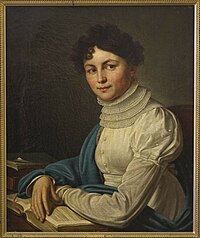Anna Bunina
| Anna Bunina | |
|---|---|

Portrait by Alexander Varnek
|
|
| Born |
January 18, 1774 Urusovo, Ryazan Governorate |
| Died | December 16, 1829 (aged 55) Denisovka, Ryazan Governorate |
| Genre | Poetry |
| Relatives | Ivan Bunin |
Anna Petrovna Bunina (Russian: А́нна Петро́вна Бу́нина; IPA: [ˈannə pʲɪˈtrovnə ˈbunʲɪnə]; January 18, 1774 – December 16, 1829) was a Russian poet. She was the first female Russian writer to make a living solely from literary work. She is an ancestor of Nobel Prize winner Ivan Bunin.
Anna was born in the village of Urusovo in Ryazan Governorate (present day Lipetsk Oblast). Her mother died in childbirth. She was raised by various relatives, and received only a rudimentary education. She began writing around the age of 13. She published her first work in 1799.
She moved to Saint Petersburg in 1802 with the help of a small inheritance from her father, where she established her own home and furthered her education by employing tutors. She devoted herself entirely to writing, supporting herself with help from patrons, and profits from the sales of her works. The Russian Imperial Family awarded her pensions in 1809, 1810 and 1813. From 1807 to 1810 she was part of the literary circle of Gavrila Derzhavin and Alexander Shishkov. She had been introduced to Shishkov by her family connections, and he became a mentor to her. In 1811 she was given honorary membership in the Lovers of the Russian Word, probably the only group of the period that accepted women members, although Bunina's membership did not allow her to discuss her works with the group in person, as male members did. Her relations with Shishkov and the Lovers of the Russian Word were oppressive to her as a woman, but helpful in advancing her literary career.
Her first work The Inexperienced Muse was published in 1809, followed by a second volume under the same title in 1812. She travelled to Britain in 1815-17 for breast cancer treatment, which was unsuccessful. She published a volume entitled Collected Works in 1819. In 1820 she was made an honorary member of the Free Society of Lovers of Literature, Science, and the Arts. She left Saint Petersburg in 1824 due to continuing illness, and lived with relatives, but retained financial independence. She died in Denisovka, Ryazan Governorate, in 1829, and was buried at Urusovo.
...
Wikipedia
